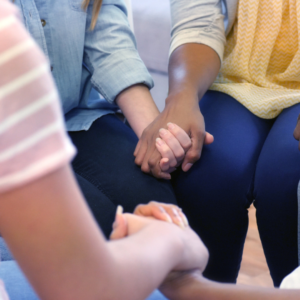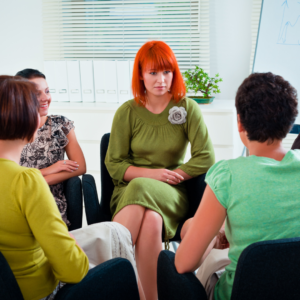Divorce is one of the most challenging life experiences anyone can go through. The emotional rollercoaster, the sense of loss, and the restructuring of your entire life can be overwhelming. Naturally, many people turn to divorce support groups for comfort, understanding, and a sense of community. These groups promise a safe space to share feelings, receive advice, and connect with others going through similar experiences. However, are these groups always as helpful as they seem?
In this blog post, we explore both the benefits and potential pitfalls of divorce support groups, and how to find the right one. While these groups can offer much-needed support, it’s important to recognise that not all experiences within these circles are positive. Understanding the potential downsides can help you make informed decisions about whether a divorce support group is right for you.

The Benefits of Divorce Support Groups
1. Emotional Support and Understanding
Divorce support groups provide a unique environment where everyone understands what you’re going through because they’ve been there too. This shared experience can offer a level of empathy and validation that friends and family, who may not have experienced divorce, can’t provide. Knowing you’re not alone in your feelings can be a huge comfort and a critical factor in your healing process.
2. A Sense of Community
Isolation is a common feeling after a divorce. Support groups create a sense of community and belonging, offering a space to share stories, fears, and triumphs. This community aspect can reduce feelings of loneliness and isolation, making you feel more connected to others.
3. Practical Advice
Support groups often serve as a resource for practical advice. Members can share tips on navigating legal processes, co-parenting challenges, financial management, and other logistical aspects of post-divorce life. Learning from others who have already gone through similar situations can save you time and stress.
4. Encouragement and Motivation
Hearing stories of resilience and recovery from others who have moved past the pain of divorce can be incredibly inspiring. These success stories can provide hope and motivation to keep moving forward, even on days when it feels impossible.

The Potential Pitfalls of Divorce Support Groups
1. Echo Chambers of Negativity
One significant risk of divorce support groups is that they can sometimes become echo chambers of negativity. While it’s important to express feelings of anger, sadness, and frustration, dwelling on these emotions without moving toward solutions can hinder your healing. Constantly revisiting painful memories or listening to others’ negative experiences can keep you stuck in a cycle of bitterness rather than moving towards acceptance and growth.
2. Anti-male or Anti-partner Sentiments
Some divorce support groups, unfortunately, become spaces where negative generalisations about men or partners are common. While it’s normal to have some anger or resentment, continuously fostering an environment of blame and hostility can be detrimental. It’s important to recognise that not all relationships fail for the same reasons, and healing often requires a balanced perspective that includes self-reflection and responsibility.
3. Reinforcing a Victim Mentality
Support groups can unintentionally encourage a victim mentality, where members feel stuck in their identity as someone who was wronged. While it’s essential to acknowledge and process feelings of betrayal or hurt, it’s equally important to empower yourself to take control of the future. Focusing too heavily on past grievances can prevent you from taking proactive steps to rebuild your life.
4. Poorly Managed Groups
Not all support groups are led by trained professionals. Groups without skilled facilitators can sometimes lack direction or structure, leading to unproductive or even harmful discussions. Without proper guidance, conversations can devolve into venting sessions with no constructive outcomes or support.
5. Confidentiality Concerns
Trust is crucial in a support group setting. However, the more people involved, the greater the risk that personal information may not be kept confidential. This breach of trust can lead to feelings of betrayal and even greater emotional distress.

Finding the Right Balance
If you decide to join a divorce support group, it’s essential to choose one that aligns with your values and goals for healing. Here are some tips to help you find the right fit:
- Research and Ask Questions: Before joining a group, do some research. Look for reviews or ask current or former members about their experiences. Find out who facilitates the group and what kind of structure and rules are in place.
- Set Personal Boundaries: Be mindful of how you feel after each meeting, or after spending time in the group. If you find that a particular group session leaves you feeling worse rather than better, it may be time to reassess whether it’s the right environment for you. It’s okay to step back if it’s not helping your healing process.
- Seek Professional Guidance: Consider a support group led by a licensed therapist, counsellor, or certified divorce coach. Professionals can provide guidance, maintain a positive and supportive atmosphere, and steer discussions toward healing and constructive coping strategies.
- Balance Support with Action: While it’s beneficial to share and listen, remember to balance these activities with actions that move you forward. Set personal goals for your healing journey, such as seeking counselling and/or coaching, pursuing hobbies, or engaging in self-care routines.

Two great online groups that I run as a Certified Divorce Coach are the Single Mother Survival Guide Support Forum and Thrive Tribe.
The Single Mother Survival Guide Support Forum is a free Facebook group I started many years ago for listeners of the Single Mother Survival Guide Podcast to connect. We have members from all over the world and at different stages of their journey. I also do weekly Struggle Strategy Session Facebook Lives to help people with their most pressing struggles. You can join our group here (just be sure to answer the questions as we are very careful about who we let in so we can keep it as genuine and safe as possible).
Thrive Tribe is a beautiful and sacred membership of like-minded mums who have either gone through the separation or divorce process, are going through it right now, or see it as being in the pipeline. Not only is it a wonderful community of support, but it is also designed to get you from just surviving, to THRIVING. In Thrive Tribe, members are given access to the Success Path – the 5-step path to empowerment. Thrive Tribe meets you where you are at in the single mum journey and gives you action items to complete which helps you reach various milestones. As you start to tick off and meet these milestones, you progress through the stages of the Success Path – and this gets you from surviving to thriving. So basically, I give you step-by-step instructions on what you can do right now to help you heal, grow, and live your best life. The beauty of this group is that it’s filled with women who WANT to live their best lives, and more than that – they are ACTION TAKERS. And that is a motivating and inspiring bunch to be around. You can sign up for the waitlist, or check if enrolment doors are currently open, here.

How a Divorce Coach Can Help
Working with a divorce coach can also be a valuable addition to joining a support group. A coach provides personalised guidance tailored to your specific needs, helping you set and achieve goals, develop coping strategies, and navigate the complex emotions that come with divorce. We can also offer advice on finding the right support groups and ensuring that your participation contributes positively to your healing journey.
Finally…
Divorce support groups can be a powerful tool for healing, offering emotional support, community, and practical advice. However, it’s crucial to be aware of the potential pitfalls and choose a group that genuinely aids in your growth and recovery. By approaching support groups with caution, and balancing group participation with personal action and professional guidance, you can create a healing environment that fosters genuine growth and emotional well-being. Remember, your healing journey is unique, and it’s essential to find the right path that suits your individual needs and empowers you to move forward.
P.S. DID YOU KNOW?
Thrive Tribe – the global membership experience for single mothers – will be opening again very soon! Join the waitlist here.
PLUS You can book one-on-one coaching with Julia Hasche from wherever you are in the world!
- Do you need clarity on whether you should leave your partner or not?
- Have you just parted ways with your partner, and feeling lost?
- Have you been single for a little while now and need assistance with getting your life back on track and feeling empowered?
Click HERE to read about coaching and to hear from some others who have gone through coaching programs with Julia, and book in here for your 30-minute complimentary Clarity Call.
The purpose of the Clarity Call is:
- For me to get to know you and understand an overview of your current situation and where you are at.
- For us to establish what you need assistance with to move forward.
- To see if we are both comfortable working together.

Know someone who needs to read this? Share it with them via the links below.
